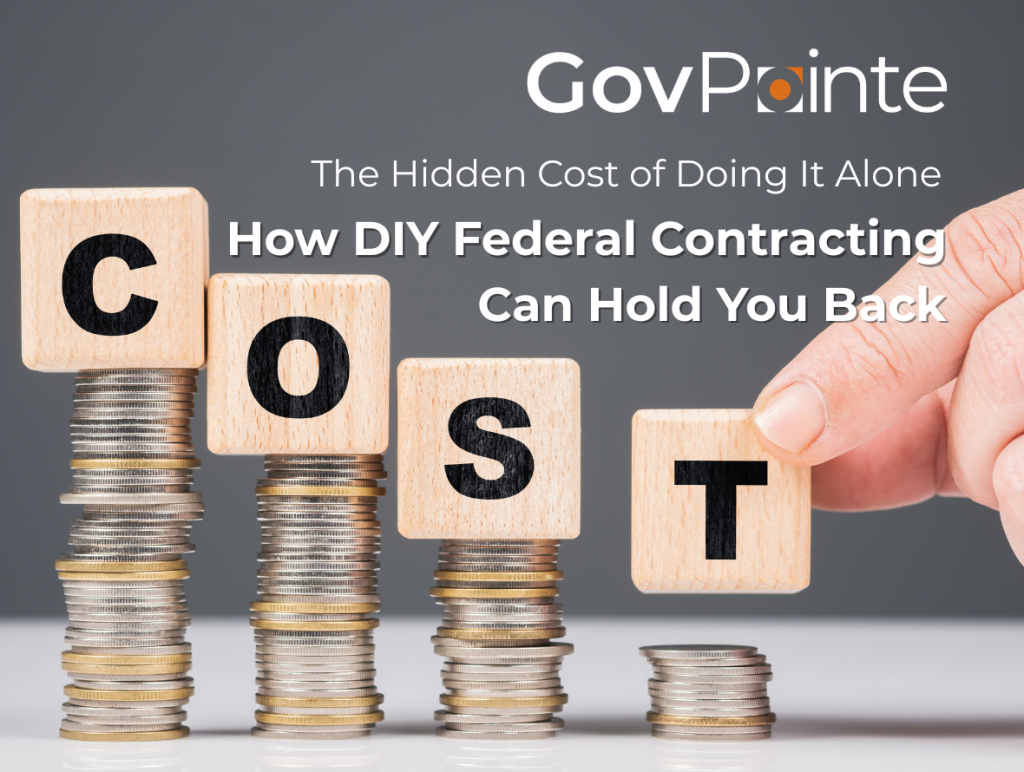The Real Price of DIY Federal Contracting Success Isn’t So Simple

For small businesses entering the federal marketplace, the allure of managing the process independently is tempting. After all, you’ve built your business on grit, resourcefulness, and resilience. But federal contracting is a world of its own—governed by thousands of pages of regulation, complex solicitation language, and unrelenting deadlines. Going solo isn’t just challenging—it can be costly.
The Real Risks of DIY Federal Contracting
The federal contracting process isn’t like bidding for private work. It’s layered with rules, acronyms, and mandatory compliance steps. Without an experienced guide, even the most capable businesses can fall into these traps:
- Missed Deadlines: Opportunities on SAM.gov can disappear in days. If you’re unfamiliar with the schedule or required prep, you’re already behind.
- Misunderstood Solicitations: Many requests for proposals (RFPs) contain nuanced instructions. Misreading one section can result in a non-responsive bid.
- Time Drain: Navigating registrations, set-aside qualifications, proposal development, and post-award compliance can take 20–40 hours per week—pulling you away from core business operations.
- Compliance Failures: Incomplete or inaccurate submissions can result in disqualification, suspension, or worse—legal and financial penalties.
The High Cost of Missed Opportunities
Consider this:
A 2023 SBA report revealed that small businesses working with federal contracting advisors were 4x more likely to win a contract within the first 12 months of engagement.
Meanwhile, businesses trying to go it alone often spend a year or more simply learning the system—submitting bids that go nowhere, duplicating efforts, or unknowingly pricing themselves out of competition.
The cost? Lost time. Lost revenue. Lost credibility with federal buyers.
Federal Priorities Are Evolving—Are You Keeping Up?
With ongoing initiatives like Buy American, Hire American and the push to increase small business participation in procurement, the government is more willing than ever to work with new vendors.
But they expect those vendors to be:
- Well-prepared
- Professionally represented
- Fully compliant
- Strategically positioned for set-asides (8(a), WOSB, SDVOSB, HUBZone)
If you’re not keeping up with these evolving priorities and processes, you’re not just delaying success—you’re reducing your chances of competing at all.
Insight Matters More Than Effort
You can pour hours into registering on SAM.gov, studying solicitations, or submitting proposals—but without the right strategy and insight, effort alone won’t win contracts. Successful businesses know that expertise is the multiplier.
They tap into proven strategies, understand how agencies evaluate bids, and present themselves in a way that federal buyers expect. And it shows—in their win rates, in their contract values, and in how quickly they scale inside the federal space.
Ready to Compete? Make Sure You’re Not Alone
The federal marketplace is growing. Small business set-asides are increasing. Agencies are more open than ever to working with new vendors. But the window of opportunity only opens wide enough for those who are prepared to walk through it—fully equipped, informed, and confident.
If you’re serious about federal contracting success, it’s time to rethink the DIY approach. Don’t let ambition be undermined by inexperience.
📈 Track agency spending at USAspending.gov
📝 Register your business or review your profile at SAM.gov
Opportunity favors the well-prepared. Make sure you’re one of them.
